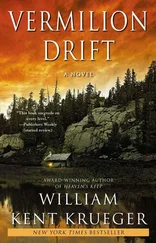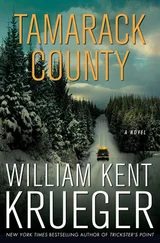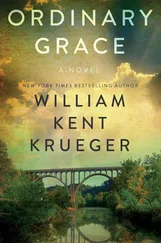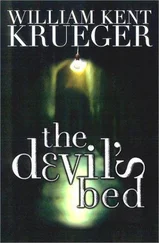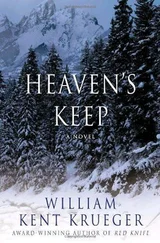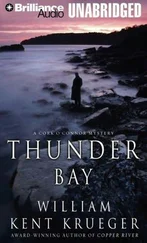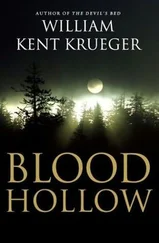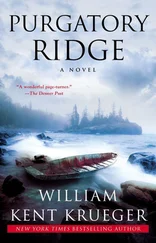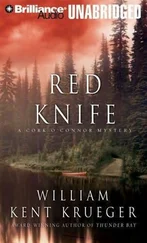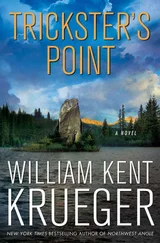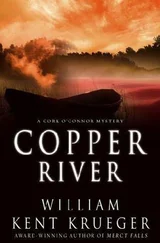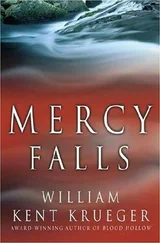“I understand Lily and her mother had their own cabin.”
“Yes.”
“Could we see it?”
“Now?”
“As good a time as any,” Cork said.
Hornett stood up and led them to the door. “You stay here, Josh. And mind Mary,” he said with a note of chastisement.
His younger brother glared at him but said nothing and obeyed.
The cabin was several hundred yards east of the peninsula where the other buildings of the camp stood. They reached it by walking a narrow path, almost overgrown now, that ran among the birches along the shoreline. It was a small, isolated little structure built of logs, without electricity and with an outhouse off to one side. The great restless blue of the big water was visible through a wide break in the trees at its back. In the wind off the lake, the sound of the birch leaves rustling was like fast-running water. Cork thought it was a lovely spot.
“It’s pretty rustic, but Vivian and Lily seemed to be just fine with what they had,” Hornett said as they approached the place. “We were planning at some point to run electricity out here and put in indoor plumbing, but all our efforts for quite a while have been focused on our larger projects.”
The door was padlocked, but Hornett brought out a set of keys, undid the lock, and shoved the door open. He stepped inside, and the others followed.
The windows were closed and clouded with dust. Judging from the stuffiness of the room, they hadn’t been opened in a great while. There was a table, and there were two chairs and two small bunks. There was a cast-iron stove for heating. That was all. Nothing personal remained in the cabin, nothing that would have spoken to the nature of the two women, mother and daughter, who’d lived there.
“What happened to Lily’s belongings?” Cork asked.
“We’ve got them boxed and stored up at the camp, should anyone ever want to claim them. There’s nothing much, though. Clothing, a few pictures. Vivian and Lily lived a pretty simple existence. Took their food with the rest of us, washed their clothes in our laundry, bathed in our showers. They didn’t need much here.”
Cork recalled the cabin on the isolated island where Jenny had found the body of Lily Smalldog. It was a simple affair, too. Lily had been used to isolation, to making do by herself. As far as Cork could see, she hadn’t had much in her life, but what little she did have was apparently enough.
“Dad,” Stephen said.
He’d wandered away from the men and stood looking at the wall of the cabin above one of the bunks. Cork joined him and saw what he’d found.
“What is it?” Hornett asked.
“A word carved into the wood,” Cork said.
Hornett came and looked, too. “I can’t make it out. Looks like gibberish. But Lily wasn’t good with reading or spelling.”
“It’s an Ojibwe word,” Stephen said. “Gizaagin.”
“What does it mean?”
“I love you.”
Stephen stepped closer and looked down, then slid the bunk out a foot and pulled a folded paper from where it had been caught between the bunk frame and the wall. He unfolded it, studied it, then handed it to his father.
It was a drawing, simple pen and ink but really quite lovely, of a deer and fawn in a meadow. It was signed “Sonny.”
Cork handed it to Tom Kretsch. Bascombe and Hornett looked at it over his shoulder.
Hornett said, “One of those little gifts I was telling you about. It didn’t take much to get that poor girl to spread her legs.”
Not much, Cork thought. Just love.
THIRTY
He stared up at Jenny with an intensity that would have been unnerving in someone grown, but he was only a baby and understood nothing except the nearness of her face, the scent of her body, the beat of her heart, the comfort of her presence, the electricity of her love. What had his mother been to him but these same things? Did he understand that, although Jenny offered him all of this, she was not his mother?
His left hand, so tiny, reached for her mouth, took her lower lip between his fingers, squeezed. He was strong, and it must have hurt her, but she made no move to stop him.
“Do you know what love is?” Rose asked.
They sat together in the dining room of Bascombe’s lodge. Lynn Belgea had come with Babs Larson and had offered to take someone back to the houseboat to get suitcases so that everyone would have clean clothing. Mal and Aaron and Anne had gone with them, and Rose and Jenny were left alone. The lodge smelled of the baking meat loaf, of herbs and hot meat juices.
Jenny carefully removed the baby’s fingers from her lip. “I used to think I did.”
“I believe it’s a life tied to another life in a way that feels inseparable. We care about a lot of people, but we choose to love a very few.”
“Choose?” Jenny looked down at the baby. “I didn’t choose this.”
“Ask your sister, and she might tell you that God chose for you. Are you unhappy with the choice?”
“Aunt Rose, do you believe, really believe, that I could love this baby? I’ve only known him for a little more than a day.”
“I believe what I see. And, Jenny, all I see in your face when you look at him is love.”
“Aaron thinks I’m crazy.”
“I think he’s just afraid.”
“Of what?”
“Of what’s in your face when you look at this child. Because it’s not what’s in your face when you look at him.”
“What I feel for Aaron is different.”
“I don’t think he understands that.”
“Come on, Aunt Rose. He’s a grown man. This is a baby.”
“A baby you’ve fallen in love with in just one day. How long did it take you to fall in love with Aaron?” When Jenny didn’t answer, Rose asked, “Are you in love with him?”
“I thought so. I don’t know now.”
Rose smiled gently. “And you wonder why he’s afraid?”
She ran her hand down her niece’s hair, smoothing wild strands in the way Jenny’s mother might have had she been alive and a part of this conversation.
“Are you afraid?” Rose asked.
“Of what?”
“Losing him.” She nodded at the little face staring up at Jenny. “He has family somewhere who have a legal right to him.”
“I know.”
The words sounded like acceptance, but what Rose heard in her niece’s voice was something more like a faint trumpet of defiance.
The baby was asleep again when they heard the cut of an engine over the sound of the wind outside. Rose went to the window and saw Babs Larson’s boat drawing up to Bascombe’s dock. Everyone piled out and walked to the lodge. They were talking in loud voices as they approached.
Rose stepped to the door and put a finger to her lips. “The baby’s asleep,” she told them.
“We’ll just stay out here then,” Larson said. “Everyone give a hand, and we’ll get these things to the cabins.”
The others headed away carrying duffel bags, but Lynn Belgea came in. Her dog was with her. He went to the basket and sniffed at the baby.
“Careful, Teddy,” Belgea said.
The dog backed away and lay down in an alert pose.
“He looks like a watchdog,” Rose said.
“He’s a good boy.” Belgea petted him fondly. “I just stepped in to check on the baby. How’s he doing?”
“He’s fine,” Jenny answered. “I wish I knew his name, though. It’s getting awkward always calling him ‘the baby’ or just ‘him.’ ”
“Maybe he doesn’t have a name yet,” Belgea said. “Did I tell you how Ted got his name?”
Jenny and Rose both shook their heads.
“I’d been alone for quite a while, and everyone on the Angle knew I was thinking of getting a dog. It was a pretty popular topic of conversation. Everyone began referring to the pet I’d get as The Eventual Dog. TED. I got so used to thinking of him that way that, when I finally brought him home, that was his name.”
Читать дальше

